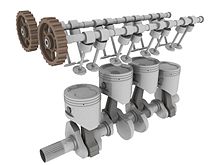Flat-plane crank
The flat-plane crank (sometimes flatplane) is a type of crankshaft for use in internal combustion engines that has a 180-degree angle between crank throws.[1]
Details
[edit]Flat-plane cranks are used in V-configuration engines, generally with eight cylinders.[1] Cadillac introduced a V8 flat-plane crank engine in 1923.[2][3]

Inline-four cylinder engines almost all use flat-plane cranks, and thus are not usually identified as such. However, there are a few exceptions with crossplane cranks.

The flat-plane crankshaft was used in the World War II Sherman Tank in the Ford GAA engine, an all-aluminium 32-valve DOHC 60-degree liquid-cooled V8. However, the flat-plane design is no longer widely used in most mass production V engines as it is more prone to vibration and is inherently much louder than a crossplane crankshaft. However, due to its simpler construction requiring less counterweight, it is inherently lighter with a higher rev limit. For this reason, it remains useful in sports and racing cars.[1] Flat-plane crankshafts are generally associated with European sports cars such as Ferrari and Lotus V8 engines, and cross-plane cranks with American manufacturers. There are some exceptions such as the Ferrari-designed crossplane crank V8 of the Lancia Thema 8.32 and the flat-plane crank 2014–2023 Ford Mustang GT350.[4] The 2023 model year Chevrolet Corvette Z06 has the largest flat-plane V8 ever seen in production cars at 5.5 litres.[5]
The way in which a flat-plane works within a V8 engine is more like two in-line 4-cylinder engines mated together,[1] with the firing order of each order being in a Right-Left-Right-Left-Right-Left-Right-Left pattern.[6] Being in this in-line configuration allows for the engine to rev much faster, making it more suitable for racing engines.
See also
[edit]References
[edit]- ^ a b c d Torchinsky, Jason (17 November 2014). "What Is A Flat-Plane Crank And Why Is It So Loud?". Jalopnik. US. Retrieved 19 April 2016.
- ^ "What is a Flat-Plane Crank?". 3 November 2014.
- ^ Frank Markus (26 October 2021). "How Chevy Designed the World's Largest Flat-Plane-Crankshaft V-8 for the 2023 Corvette Z06". Motor Trend. Retrieved 6 December 2021.
in 1923 Cadillac introduced a cross-plane crankshaft with counterweights that quelled the nasty secondary vibrations (those that happen twice per revolution) inherent in a flat-plane crank for a smoother, more luxurious experience
- ^ "Full text of "Motor January 2016"". Retrieved 19 April 2016.
- ^ Perkins, Chris (27 October 2021). "How Chevrolet Created the Most Powerful Naturally Aspirated V-8 Ever For the New Z06". US: Road and Track. Retrieved 30 October 2021 – via MSN.
- ^ Clark, John. "Flat Plane Crank". Projectm71. Retrieved 3 May 2019.
